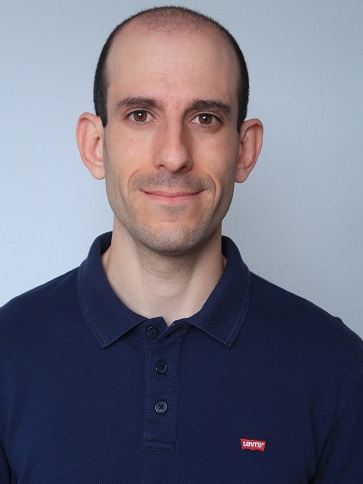Keynote Speakers

TALK TITLE: Synthetic Data and Foundation Models: Challenges and Opportunities in Security Applications
BIOGRAPHY
Ruben Tolosana received the M.Sc. degree in Telecommunication Engineering, and the
Ph.D. degree in Computer and Telecommunication Engineering, from Universidad
Autonoma de Madrid, in 2014 and 2019, respectively. In 2014, he joined the Biometrics
and Data Pattern Analytics Laboratory (BiDA-Lab) at the Universidad Autonoma de
Madrid, where he is currently an Associate Professor. He is a member of the ELLIS
Society and ELLIS Unit Madrid, Technical Area Committee of EURASIP, and Editorial
Board of the IEEE Biometrics Council Newsletter. His research interests are mainly
focused on signal and image processing, pattern recognition, and machine learning,
particularly in the areas of DeepFakes, Human-Computer Interaction, Biometrics, and
Health. He is the author of more than 100 scientific articles published in international
journals and conferences, selected as one of the most influential researchers in the
world according to “Ranking of the World Scientist: World Top 2%” in 2023 and 2024,
carried out by Stanford University and Elsevier. He has served as General Chair and
Program Chair (IEEE AVSS 2022), and Area Chair (IEEE IJCB 2023, IEEE/IAPR ICPR
2022) in top conferences. Recently, he has also organized key international workshops
and challenges in top AI conferences such as FRCSyn (IEEE/CVF CVPR-2024 and
WACV-2024), ReFIP (IEEE FG-2024), WAMWB (ACM MobileHCI-2023), KVC (IEEE
BigData-2023), etc. Finally, Dr. Tolosana has also received several awards such as the
“European Biometrics Industry Award (2018)” from the European Association for
Biometrics (EAB) and the “Juan Lopez de Peñalver Award (2024)” from the Spanish
Royal Academy of Engineering for his research contributions and transfer of
technologies.

Dr. Jorge Portilla
Associate Professor en Universidad Politécnica de Madrid
TALK TITLE: Post-Quantum Security in IoT at the Extreme Edge.
Abstract
In an increasingly technological world, the security of digital information has become a critical need. With the advancement of quantum computing, many of today’s cryptographic systems, which protect everything from banking communications to government secrets, could become vulnerable. Post-quantum security emerges as a response to this challenging threat, offering new cryptographic schemes that are resistant to attacks by future quantum computers. This field aims to ensure the confidentiality, integrity, and authenticity of information even in a scenario dominated by unprecedented computational capabilities.
This need for protection becomes even more urgent in the context of the Internet of Things (IoT), especially in extreme edge scenarios where devices operate in remote environments with limited resources and intermittent connectivity. In such cases, implementing post-quantum security solutions presents a dual challenge: providing resistance to quantum threats without compromising performance, energy efficiency, or device latency. The integration of post-quantum cryptography at the extreme edge of IoT is not just a necessary technological evolution but also a fundamental requirement for building resilient and trustworthy systems in the post-quantum era.
This need for protection becomes even more urgent in the context of the Internet of Things (IoT), especially in extreme edge scenarios where devices operate in remote environments with limited resources and intermittent connectivity. In such cases, implementing post-quantum security solutions presents a dual challenge: providing resistance to quantum threats without compromising performance, energy efficiency, or device latency. The integration of post-quantum cryptography at the extreme edge of IoT is not just a necessary technological evolution but also a fundamental requirement for building resilient and trustworthy systems in the post-quantum era.
BIOGRAPHY
Jorge Portilla is an Associate Professor at the Universidad Politécnica de Madrid (UPM), where he conducts research at the Centro de Electrónica Industrial. He holds an M.Sc. in Physics from Universidad Complutense de Madrid (UCM) and a Ph.D. in Electronic Engineering from UPM. He has contributed to over 40 funded research projects, mostly in H2020 and Horizon Europe programs, national grants, and industry collaborations. His international experience includes research stays at Industrial Technology Research Institute (ITRI) and Taipei Tech in Taiwan. His main research interests include wireless sensor networks, Internet of Things at the edge, digital embedded systems, FPGA-based reconfigurable platforms, and cybersecurity in embedded systems. He is currently the director of the Centro de Electrónica Industrial at UPM.

Dr. Long Zhang
Senior Lecturer (Associate Professor)
TALK TITLE: Data-driven methods and their applications to Renewable Energy
Abstract
Renewable energy, particularly wind and solar power, has seen rapid and widespread deployment over the past two decades — a trend that is expected to continue in the coming decades to help meet the 2050 carbon emissions targets. For instance, the latest offshore wind turbines now have capacities exceeding 20 MW, with rotor diameters of around 300 meters. More recently, ocean renewable energy — such as wave and offshore wind power — has also been recognized as a key area of potential growth in the coming decades. To ensure these large-scale renewable energy systems operate efficiently and safely throughout their typical 20- to 25-year lifespan and beyond, it is crucial to adopt effective planning, design, and operational strategies. Advanced techniques in system design and operation are particularly important for reducing the overall cost of renewable energy.
This talk will present a range of data-driven approaches — including statistical and machine learning methods, system identification, and frequency-domain techniques — and explore their applications in wind, wave, and solar power. Case studies will illustrate how these methods support planning, design, condition monitoring, and fault diagnosis in real-world renewable energy systems.
This talk will present a range of data-driven approaches — including statistical and machine learning methods, system identification, and frequency-domain techniques — and explore their applications in wind, wave, and solar power. Case studies will illustrate how these methods support planning, design, condition monitoring, and fault diagnosis in real-world renewable energy systems.
BIOGRAPHY
Dr Long Zhang is a Senior Lecturer in the Department of Electrical and Electronic Engineering at The University of Manchester. His research focuses on data-driven methods, including machine and statistical learning, neural networks, system identification, frequency analysis, condition monitoring, intelligent control, and instrumentation — with practical applications in smart renewable energy, robotics, and transportation systems.
His work has been extensively supported by funding bodies such as EPSRC, EPSRC IAA, Innovate UK, and various industrial partners. He has secured over £2.5 million in research funding as Principal Investigator or Co-Investigator. Dr Zhang is the founding director of the first industrial-scale wind turbine pitch bearing and blade laboratory, and he has led pioneering work in fault detection for wind turbine pitch bearings. He also serves as the Director of the MSc programme in Advanced Control and Systems Engineering.
His work has been extensively supported by funding bodies such as EPSRC, EPSRC IAA, Innovate UK, and various industrial partners. He has secured over £2.5 million in research funding as Principal Investigator or Co-Investigator. Dr Zhang is the founding director of the first industrial-scale wind turbine pitch bearing and blade laboratory, and he has led pioneering work in fault detection for wind turbine pitch bearings. He also serves as the Director of the MSc programme in Advanced Control and Systems Engineering.

Dr. Andrés Otero
Associate Professor
TALK TITLE: Neuromorphic Architectures and Evolutionary Algorithms for Self-* Cyber-Physical Systems (CPS)
Abstract
One of the primary challenges in designing Cyber-Physical Systems (CPS) is providing them with the capability to adapt and respond to changes in the environment, system requirements, or operational conditions autonomously, without direct human intervention. The crucial aspect lies in the ability to reconfigure and self-adjust the systems to ensure optimal performance.
In this talk, the focus will be on addressing adaptability in Self-* CPSs from an architectural perspective, combining evolutionary computation with artificial neural networks, commonly known as neuroevolution. Special emphasis will be given to various architectural approaches, including block-based, neuromorphic, and deep neural networks, which serve as targets for continuous optimization and self-adaptation enabled by evolutionary algorithms. By embedding learning capabilities within CPSs, they can achieve self-optimization and self-adaptation, leading to continuous or lifelong learning. The talk will explore different applications in image processing, physical control, and reinforcement learning domains.
In this talk, the focus will be on addressing adaptability in Self-* CPSs from an architectural perspective, combining evolutionary computation with artificial neural networks, commonly known as neuroevolution. Special emphasis will be given to various architectural approaches, including block-based, neuromorphic, and deep neural networks, which serve as targets for continuous optimization and self-adaptation enabled by evolutionary algorithms. By embedding learning capabilities within CPSs, they can achieve self-optimization and self-adaptation, leading to continuous or lifelong learning. The talk will explore different applications in image processing, physical control, and reinforcement learning domains.
BIOGRAPHY
Dr. Andrés Otero holds a degree in Telecommunications Engineering from the University of Vigo, where he graduated with honors in 2007. He completed a master’s and a PhD in Industrial Electronics at the Universidad Politécnica de Madrid (UPM) in 2009 and 2014, respectively. Additionally, he holds a specialization diploma in Signal Processing and has undertaken some studies in Physics at UNED. As a researcher, he is part of the Centro de Electrónica Industrial (CEI) at UPM. His research interests include embedded and/or reconfigurable systems, microelectronic design, evolutionary computing, and edge machine learning. As a result of this work, he has co-authored 23 articles in JCR-indexed journals, such as IEEE Transactions on Computers, IEEE Internet of Things Journal, and IEEE Sensors. He has also published two book chapters and over 30 conference papers at venues like FPL, ReConFig, AHS, DATE, and ARC. He co-authored the best paper award winners at ReConFig 2012 and ARC 2020. Andrés Otero is a regular member of the program committees of several of these conferences, having served as Program Chair of ReCoSoC 2017 and Track Chair at FPL 2021, and he is also an editor of IEEE Transactions on Computer-Aided Design of Integrated Circuits and Systems (IEEE TCAD). His research has been developed within the framework of publicly funded projects, both national (DR. SIMON, DREAMS, REBECCA, PLATINO, TALENT, and MANIAS) and European (SMART, ENABLE-S3, ENVIGUARD, FASTCUDA, CERBERO, KYKLOS4.0, InSecTT, A-IQReady, and MYRTUS), being the Principal Investigator for some of these projects. Andrés Otero has also supervised two PhD theses both awarded the Cum Laude distinction, and he is currently supervising or co-supervising eight more.

Dr. Gloria Bueno
Full Professor, Universidad de Castilla-La Mancha
TALK TITLE: The Fragile Side of AI: Understanding Hidden Pitfalls, Systemic Failures, and Their Implications
Abstract
Artificial Intelligence is rapidly reshaping critical domains such as healthcare, autonomous transportation, law, and public safety. Yet alongside remarkable progress, AI systems increasingly reveal diverse failures with significant technical, economic, and societal repercussions. This talk presents a comprehensive taxonomy of AI errors, encompassing algorithmic and perception failures, such as hallucinations where language models confidently generate false or misleading information and deep-rooted biases in data and algorithms that reinforce existing inequalities, particularly in areas like facial recognition and automated credit assessments. A central focus is on adversarial examples, small, often imperceptible input perturbations that can dramatically alter a model’s output. These subtle manipulations expose structural vulnerabilities, as seen when minor changes to a stop sign’s texture cause an autonomous system to misinterpret it as a speed limit sign, posing clear safety risks. Beyond technical flaws, we delve into project-level and organizational shortcomings, including poorly defined objectives, low-quality or biased datasets, lack of rigorous validation under real-world conditions, and deployments rushed by commercial or competitive pressures. Drawing on diverse case studies and recent empirical research, this talk proposes an integrated framework to analyze these failures by their technical or social nature, predictability, mitigability, and the degree of human involvement. It also highlights why adversarial vulnerabilities uniquely underscore the absence of true semantic comprehension in current AI architectures. We conclude by outlining practical strategies and future research directions to enhance AI’s robustness, explainability, and ethical alignment from the earliest stages of design and deployment.
BIOGRAPHY
Dr. Gloria Bueno holds a BSc in Physics (1993) and a PhD in Computer Vision (1998), awarded by Coventry University (UK), where she specialized in advanced methodologies for image understanding. Currently, she is a Full Professor at the School of Industrial Engineering of the University of Castilla-La Mancha (UCLM), where she has been based since 2003. At UCLM, she leads the VISILAB research group, a team dedicated to exploring cutting-edge problems in Computer Vision and Artificial Intelligence. Her academic trajectory includes a Marie Curie postdoctoral fellowship at Université Louis Pasteur (Strasbourg, France), and significant research stays at the Institut Physique Biologique (France) and Centro de Estudios e Investigaciones Técnicas de Gipuzkoa (Spain), where she applied AI-driven approaches to both biomedical diagnostics and industrial inspection systems. Throughout her career, she has served as Principal Investigator on 24 publicly funded research projects, five of them at the European level. Prof. Bueno actively collaborates with globally renowned institutions, including CERN, CEA, CNRS, CSIC, and INRIA, fostering international partnerships that have fueled joint publications and shared technological developments. Her expertise has enabled technology transfer to companies such as SIEMSA, INDRA, and Leica Biosystems. In 2009, she was a visiting professor at Carnegie Mellon University (USA), engaging with leading experts in robotics and computational imaging. She is member of IEEE, SEIB and SPIE, a promoter of the ESDIP scientific society, and a founding partner of the UBOTICA Ltd. Her work stands
at the intersection of fundamental research and real-world impact, bridging the gap between academic innovation and industrial application.

Dr. Mayorkinos Papaelias
Full Professor, University of Birmingham
TALK TITLE: Autonomous marine robotic systems for sustainable data collection from our oceans and seas: The ENDURUNS and MERLIN projects
Abstract
Autonomous marine robotic systems have the potential to play a vital role in enabling sustainable, long-term data collection from our oceans and seas, particularly in areas that are remote, deep, or environmentally sensitive. Two innovative European projects—ENDURUNS and MERLIN—have been at the forefront of this effort. The H2020 ENDURUNS project developed an autonomous, hybrid-powered underwater robotic system capable of deep-sea exploration and seabed mapping, using renewable energy sources such as wave and solar power to minimize environmental impact and extend operational endurance. Building on this foundation, the ongoing Horizon Europe MERLIN project is advancing the integration of various types of sensors, AI-based navigation, and improved energy autonomy into next-generation autonomous marine robotic platforms. Both projects aim to support a sustainable Blue Economy by enabling efficient environmental monitoring, climate research, and resource assessment without relying on traditional, fuel-intensive marine operations. These robotic systems not only reduce human risk and operational costs but also contribute to real-time, high-resolution ocean data that is essential for informed marine policy and conservation strategies.
BIOGRAPHY
Professor Mayorkinos Papaelias is a leading academic in the field of Non-Destructive Testing (NDT) and Condition Monitoring, currently serving as a Professor at the School of Metallurgy and Materials, University of Birmingham. He earned his Ph.D. in Metallurgy from the same university in 2004, following an MSc in New Materials from the University of Aberdeen and a B.Eng. (Hons.) in Materials Science and Engineering from Queen Mary, University of London. His research focuses on structural health monitoring, particularly in the energy and transport sectors, with applications in wind turbines, railway systems, and marine infrastructure and robotic systems. Professor Papaelias has published over 150 peer-reviewed journal and conference papers and has co-authored and edited several books, including Maintenance Management (2020) and Non-Destructive Testing and Condition Monitoring Techniques in Wind Energy (2023). He has led and contributed to numerous high-impact European research projects under FP6, FP7, H2020, and Horizon Europe, such as OPTIMUS, ENDURUNS, and MERLIN. In addition to his academic work, he is an active member of professional bodies, chairing the Education Committee of the International Society for Condition Monitoring, and has served as a consultant to various industrial and research organizations. His teaching spans undergraduate and postgraduate courses in NDT, condition monitoring, and nuclear reactor physics, reflecting his deep commitment to both research excellence and education.